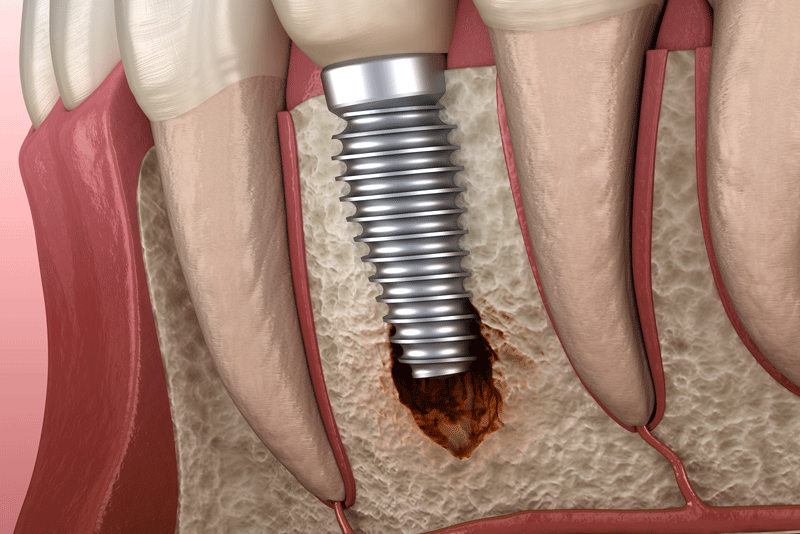Dental implants are a popular and effective way to replace missing teeth in Boston, MA. The implant itself is a small metal post that is surgically inserted into the jawbone. Once in place, the implant acts as a new root for a dental prosthetic, such as a crown or dental bridge. While dental implants are very successful, they can occasionally be associated with a condition called peri-implantitis. Peri-implantitis occurs when the tissue around the single or full mouth dental implant becomes inflamed and infected.
If left untreated, peri-implantitis can lead to bone loss and eventually cause the dental implant to fail. However, this is typically only seen in cases where there is poor oral hygiene or an underlying medical condition that compromises the immune system. With proper care, dental implants can provide a long-term solution for missing teeth.
What Is Peri-Implantitis?
Peri-implantitis is an inflammation of the tissues surrounding an implant. It can lead to bone loss and the swelling and bleeding of the gums. As the gums swell, they may also develop pus in the infected tissue. Closely monitored treatment may be necessary that could include antibiotics. In some cases, the implant may need to be removed. If you have dental implants, it is important to be aware of the signs and symptoms of peri-implantitis so that you can seek treatment if necessary.
Smoking Can Lower Your Dental Implant Success Rate
Dental implants as an investment have grown in popularity over the years in Boston, MA, and for good reason. They have a high success rate and can last for many years with the proper care. However, it is important to remember that dental implants are not without risk. There is always a chance of dental implant failure, and that number could be higher if you are a smoker. Smoking often makes it more difficult to identify warning signs that something is amiss, which often leads to peri-implantitis. For example, the gums tend to look discolored for a patient that smokes, due to decreased blood flow. In addition, there have been studies showing how implant patients that smoke regularly have a higher risk of developing peri-implantitis when undergoing implant procedures. While dental implants are a great option for many people, it is important to weigh the risks before deciding.
How Can You Increase Your Implant Success Rate?
The good news is that you can still take action to increase the success rate of a dental implant procedure. By working with our doctor, you may be able to stop smoking long enough before your procedure to help some of the tissue heal. Ideally, you should stop smoking altogether for the best results, but let the tissue heal entirely at the very least.
Ask Your Dentist If Implants Are An Option
Peri-implantitis can have a devastating effect on your dental implant procedure, and it may not even show up right away. Smoking automatically puts patients at a higher risk for the infection and implant failure. Contact our doctors, Dr. Mauro Stuparich and Dr. Alexandra Nouel, and the dental team in our office by Boston, MA to schedule your consultation today!




